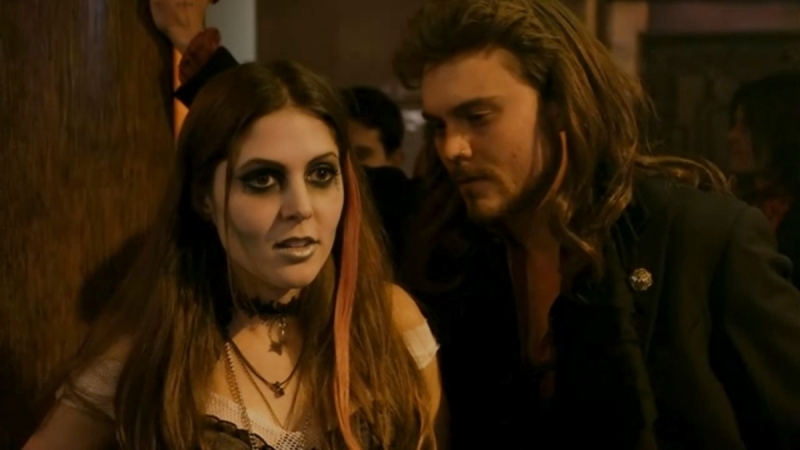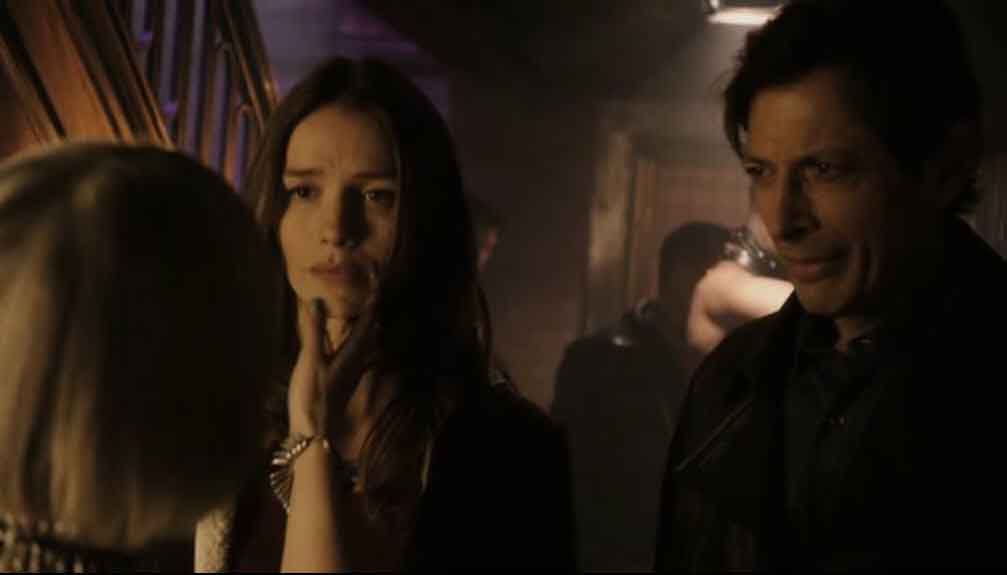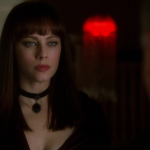Law & Order: Criminal Intent’s episode “Lost Children of the Blood” aired July 25, 2010
A college student found drained of blood in her dorm room leads Detectives Nichols (Jeff Goldblum) and Stevens (Saffron Burrows) to the underground culture of blood fetishists.
The victim, Sarah Price, has quotes from Carl Jung and Michel Foucault all over her dorm room. Nichols finds a deluxe copy of Jung’s Red Book. “He [Jung] thought everybody should have a red book. All disturbing thoughts written down and filed away.”
Sarah’s boyfriend Kyle admits that they did go to a club together, and did blood play.
Kyle: “It was just exploring boundaries. Sarah and I wanted something real and authentic.”

While the original Law & Order series almost exclusively stuck to the perspective of the detectives and prosecutors, Criminal Intent features scenes focusing on other characters. In this case, the narrative follows Kyle to the club drug dealer Virgil. Kyle says he blacked out after he argued with Sarah, and Virgil promises to provide an alibi for him.
As is typical for these types of procedural episodes, there’s a scene of the investigators visiting a dungeon and reacting to the people and acts they see. Detective Stevens makes her feelings clear. “And me without my Purell.”
The detectives talk to each other about the people here as if they aren’t in earshot, like colonial explorers studying the natives.
Nichols: “Hard to imagine that all these people weren’t just born here. That they had other lives.
Stevens: “Many still do. Jobs, kids at home, wifey over the stove.”

The party’s female proprietor comes on strong to Stevens, even touching her hair, while Nichols keeps peeping at the scenes with a voyeur’s smirk. There’s a shot of Nichols looking around a corner at something, but no reverse shot of what the character is looking at.
Nichols: “We’re looking for people who drink human blood.”
[…]
Proprietor: “Yes, some drink blood. People don’t come here to hide who they are. The darkness flows.”
Stevens: “Oh really? Flows to what purpose?”
Proprietor: “Self-awareness. As Dr. Jung suggested, face your demons, get to know, even love them, and you’ve opened up your soul.”
After extracting a link to a suspect, the detectives keep talking outside.
Nichols: “Some people need to push limits. Ignoring any element of our nature, even the darker sides, limits knowing who we are.”
Stevens: “Is that the hermetic wisdom of Jung’s red book? Or your own rationale for cheap thrills?”
Nichols: “Foucault called them limit experiences. Going beyond where you feel it’s safe. Similar to meditation.”
Stevens: “Well, with meditation you give yourself up to a sense of harmony, of peace.”
Nichols: “But erasing the boundaries between the conscious and the unconscious, who knows what you’ll find?”
Stevens: “Like a vampire craze posing as a thing.”
The detectives look up Jeremy Parks, aka “Anton”, who runs a kind of small-scale cult in a loft. He attributes his lush lifestyle to “bored, upper East Side women who pay for encounters. Love in vein, if you’ll allow the pun.”
There’s a conflict between the suspects with their self-created identities and the detectives who keep trying to drag them down to the mundane.
The victim’s father barges in, and Anton gloats, “Parents like you send them to me. […] They’ll come. They’ll always come. And there’s nothing you can do to stop them.”
The detectives convince a wealthy society woman to show her bite marks. She explains, “I know what you’re thinking, but it’s very intimate. It feels, it’s very different than what I’m used to. We were together until first light of dawn, I mean.”
The detectives link Anton to Virgil (also an assumed name), who has an arrest record from Florida. He was 12 at the time of an earlier blood-draining kidnapping, covered heavily in the news. “Rich fodder for the adolescent masturbatory fantasies of a disturbed youth,” says Nichols.
They also link this to his mother’s work at a meat-packing plant. They imagine him seeing his mother coming home covered in blood and showering it off, as inspiration for violent fantasies.
Nichols: “The same basic behavior that can kick-start a serial killer.”
When they interview Virgil at his job in a funeral home, they attempt to puncture his creepy vampire persona. Virgil responds that it is better to be a vampire than a pariah.
Nichols says Virgil is a “textbook psychotic”: fearless, without empathy, and possibly delusional. Draining Sarah would make him feel authentic.

Virgil kills Sarah’s boyfriend and drains him of blood, then attempts to frame Anton for the death. Anton denies this on spiritual grounds, while the detectives say that Virgil is just a garden-variety psychopath who manipulated him to bring him victims, then abandoned him. Anton cracks and fingers Virgil who gets arrested.
When the detectives see Virgil in an orange prison jumpsuit, she comments, “At last, the real you.” They have completely dismantled his mystique.
“Lost Children” is clearly written from the perspective of adults anxious about the younger generation. The problem is seen as a problem specifically of youth, rather something that can occur to people of any age. Sarah’s death is a red state conservative’s nightmare scenario: their precious daughter goes to the wicked city, gets lead onto the wrong path by a liberal education, and ends up gruesomely murdered. The victim’s father, an Ohio congressman, says, in a news conference, that the society failed her. “She was going through a phase,” he says to the detectives. Conversely, the detectives’ superior argues that young people do risky things and then straighten out on their own.
The moral panic subtext continues with the episode’s claim that there is an underground subculture of blood fetishists, brought on by the vampire craze (e.g. the Twilight franchise) and supported by “blood whores.” This gets into some uncomfortable racial issues when the detectives track down a male immigrant from West Africa, whose extremely rare blood type is said to be in high demand from the white blood fetishists.
Instead of humanizing the kinky people by exploring other facets of their lives, the episode focuses on the exploitative and murderous Virgil, who uses everybody around him. There’s lip service paid to the spiritual or psychological value of sadomasochism, but Stephens remains completely dismissive and skeptical.




[…] Four Weddings and FuneralLaw & Order Criminal Intent S09E11 […]
[…] Four Weddings and Funeral Law & Order Criminal Intent S09E11 […]
[…] Four Weddings and FuneralLaw & Order Criminal Intent S09E11 […]
[…] Four Weddings and FuneralLaw & Order Criminal Intent S09E11 […]
[…] Law & Order Criminal Intent S09E11 […]
[…] Four Weddings and FuneralLaw & Order Criminal Intent S09E11 […]
[…] Four Weddings and FuneralLaw & Order Criminal Intent S09E11 […]
[…] Four Weddings and Funeral Law & Order Criminal Intent S09E11 […]
[…] Four Weddings and FuneralLaw & Order Criminal Intent S09E11 […]
[…] Four Weddings and FuneralLaw & Order Criminal Intent S09E11 […]